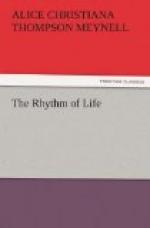Because Impressionism is so free, therefore is it doubly bound. Because there is none to arraign it, it is a thousand times responsible. To undertake this art for the sake of its privileges without confessing its obligations—or at least without confessing them up to the point of honour—is to take a vulgar freedom: to see immunities precisely where there are duties, and an advantage where there is a bond. A very mob of men have taken Impressionism upon themselves in this our later day. It is against all probabilities that more than a few among these have within them the point of honour. In their galleries we are beset with a dim distrust. And to distrust is more humiliating than to be distrusted. How many of these landscape-painters, deliberately rash, are painting the truth of their own impressions? An ethical question as to loyalty is easily answered; truth and falsehood as to fact are, happily for the intelligence of the common conscience, not hard to divide. But when the dubium concerns not fact but artistic truth, can the many be sure that their sensitiveness, their candour, their scruple, their delicate equipoise of perceptions, the vigilance of their apprehension, are enough? Now Impressionists of late have told us things as to their impressions—as to the effect of things upon the temperament of this man and upon the mood of that—which should not be asserted except on the artistic point of honour. The majority can tell ordinary truth, but they should




